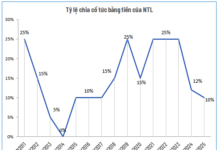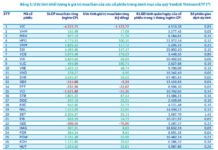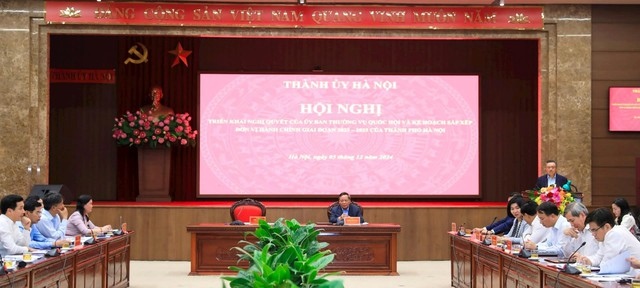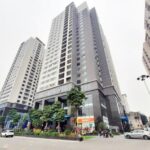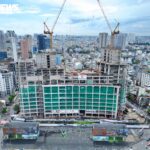On the afternoon of the 5th of December, the Hanoi Party Committee organized a conference to deploy the Resolution of the National Assembly’s Standing Committee and the city’s plan for the arrangement of administrative units for the period of 2023-2025.
At the conference, Director of the Department of Home Affairs Tran Dinh Canh promulgated Resolution No. 1286 of the National Assembly’s Standing Committee on the arrangement of the city’s communal-level administrative units for the period of 2023-2025, which will take effect from January 1, 2025. The Resolution stipulates the arrangement of 109 communal-level administrative units to form 56 new communal-level administrative units in 20 districts, counties, and towns of Hanoi.
From the effective date of the Resolution, Hanoi will have 30 district-level administrative units, including: 17 rural districts, 12 urban districts, and 1 town. These will consist of 526 commune-level administrative units, including: 345 communes, 160 wards, and 21 townships (with no change in the number of district-level units and a reduction of 53 commune-level units compared to the present).
Regarding finances and public assets in the implementation of administrative unit arrangement, Director of the Department of Finance Nguyen Xuan Luu shared that out of the 109 commune-level office buildings involved in the arrangement, according to the proposed handling plan of the districts, counties, and towns, 99 office buildings will be retained for continued use as offices of the new administrative units or converted into community houses, village cultural houses, or ward cultural houses, to be managed by the People’s Committees of the new administrative units. Six office buildings will be transferred to other agencies for use as schools or public security offices, and four office buildings will be transferred to the district-level People’s Committees.
Director Nguyen Xuan Luu also emphasized that no fees will be collected for the conversion of documents related to the arrangement of administrative units, in accordance with the spirit of the Resolution of the National Assembly’s Standing Committee.
On the matter of residence management and updating citizen information in the national database, Director of the Hanoi Public Security, Lieutenant General Nguyen Hai Trung, assured that citizen information will be transferred to the new administrative units in both digital and physical formats.
Providing clarification on personnel matters in administrative units undergoing arrangement, Director Tran Dinh Canh of the Department of Home Affairs, stated that the department will provide guidance on transferring commune-level officials and civil servants to state civil servants.
“For the heads of units, we request that localities prioritize the salary and rank arrangement for Party officials so that we can issue decisions before December 31. Even if these officials later become deputies, they will still be civil servants,” said Tran Dinh Canh.
Regarding the transfer of officials from wards to districts or from districts to units of a non-business nature, Mr. Canh affirmed that there will be no intake of officials from other provinces, but transfers within the city will proceed as normal, with priority given to districts, counties, towns, communes, wards, and townships that are undergoing administrative unit arrangement.
Speaking at the conference, Mr. Nguyen Van Phong, Permanent Deputy Secretary of the Hanoi Party Committee, requested that localities take the initiative in leadership and direction, continue to do well in ideological work and grasp social sentiments, and prepare for party congresses at all levels in the administrative units undergoing arrangement. He particularly emphasized the need for a roadmap in personnel arrangement and consistency in ideological work.
Nguyen Huong
The Capital’s Resolve: Expediting Delayed External-Capital Projects Involving Land
The Hanoi People’s Committee has identified 712 non-budgetary capital projects that have been delayed due to land-related issues. In response, they have formulated a plan to address and resolve these delays.
The Capital Speaks Up: Addressing the Issue of Unissued Pink Books in Residential Complexes
Among the four apartment buildings in Thanh Xuan District where apartment ownership certificates (pink book) have not been issued, the developers of The Legacy and Golden West have yet to complete the legal documentation for their projects and submit them to the Department of Natural Resources and Environment. On the other hand, the developers of Starcity Center and Song Da – Viet Duc apartments have already submitted their legal documents, and the Department is currently reviewing them to issue the pink books for the respective apartments.
The Capital’s Land Allocation: Auctioning Off 30,500 sqm for Social Housing Development
The recent allocation of land in Tam Hung, Thanh Oai district, by the Hanoi People’s Committee, marks an exciting development. Out of the total area of nearly 30,500 square meters, almost 10,000 square meters of residential land will be auctioned, with an additional 5,000 square meters designated for social housing construction. This news signals potential opportunities for investors and developers, as well as a positive step towards addressing housing needs in the area.












